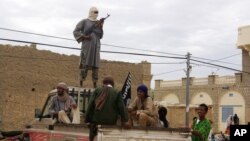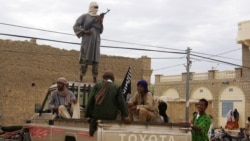“Terrorist groups continue to threaten peace, security, and stability across Africa,” said United States Ambassador to the United Nations Susan Rice.
In the Sahel, al-Qaida in the Islamic Maghreb joined with mercenary fighters fleeing Libya to exploit the Tuareg rebellion and overrun the northern two-thirds of Mali. In Nigeria, said Ambassador Rice, “Boko Haram and Ansaru are taking advantage of poor socio-economic conditions and popular discontent to challenge state authorities and sow communal conflict.” In Somalia, al-Shabaab is still launching attacks on the Somali government and people.
Nevertheless, said Ambassador Rice, the fight against terrorism in Africa has made progress over the last year. Somalia and Mali show how international and regional cooperation and action can weaken terrorist groups. Working together, French, Chadian, and Malian forces have taken on a growing terrorist haven in Mali. The United Nations Security Council authorized two missions to help stabilize the country.
“And yet, al-Qaida and affiliated groups,” said Ambassador Rice, “remain dangerous.” With fragile new governments in North Africa, violent extremists have exploited porous borders, political vacuums, local grievances, and socio-economic stresses to pursue their deadly objectives.
Meanwhile, terrorists in North Africa continue to fund their operations through increasingly sophisticated tactics. Transnational terrorists are trafficking weapons, drugs, and even human beings to raise money for their attacks. Kidnapping for ransom continues as a particularly barbaric means of raising money.
A comprehensive strategy is the only effective means to counter terrorism. That’s why the United States has intensified capacity-building assistance to African partners. The Trans-Sahara Counterterrorism Partnership and Partnership for Regional East African Counterterrorism help African states develop law enforcement capacity including border security, advance economic development, promote regional cooperation, and discredit terrorist ideology.
Ultimately, reducing the threat of terrorism in Africa demands a broader effort to create freer, more prosperous and tolerant societies in which radicalization is rare, opportunity is palpable, and hope thrives.
This requires fighting poverty and corruption, expanding trade and investment, effective conflict prevention, improving governments’ delivery of services to their peoples and ensuring that people are able to hold their governments accountable. Through this framework and in partnership with the people and governments of the continent, the United States is working to empower citizens, promote good governance, strengthen human rights and the rule of law, and boost economic growth and development.
In the Sahel, al-Qaida in the Islamic Maghreb joined with mercenary fighters fleeing Libya to exploit the Tuareg rebellion and overrun the northern two-thirds of Mali. In Nigeria, said Ambassador Rice, “Boko Haram and Ansaru are taking advantage of poor socio-economic conditions and popular discontent to challenge state authorities and sow communal conflict.” In Somalia, al-Shabaab is still launching attacks on the Somali government and people.
Nevertheless, said Ambassador Rice, the fight against terrorism in Africa has made progress over the last year. Somalia and Mali show how international and regional cooperation and action can weaken terrorist groups. Working together, French, Chadian, and Malian forces have taken on a growing terrorist haven in Mali. The United Nations Security Council authorized two missions to help stabilize the country.
“And yet, al-Qaida and affiliated groups,” said Ambassador Rice, “remain dangerous.” With fragile new governments in North Africa, violent extremists have exploited porous borders, political vacuums, local grievances, and socio-economic stresses to pursue their deadly objectives.
Meanwhile, terrorists in North Africa continue to fund their operations through increasingly sophisticated tactics. Transnational terrorists are trafficking weapons, drugs, and even human beings to raise money for their attacks. Kidnapping for ransom continues as a particularly barbaric means of raising money.
A comprehensive strategy is the only effective means to counter terrorism. That’s why the United States has intensified capacity-building assistance to African partners. The Trans-Sahara Counterterrorism Partnership and Partnership for Regional East African Counterterrorism help African states develop law enforcement capacity including border security, advance economic development, promote regional cooperation, and discredit terrorist ideology.
Ultimately, reducing the threat of terrorism in Africa demands a broader effort to create freer, more prosperous and tolerant societies in which radicalization is rare, opportunity is palpable, and hope thrives.
This requires fighting poverty and corruption, expanding trade and investment, effective conflict prevention, improving governments’ delivery of services to their peoples and ensuring that people are able to hold their governments accountable. Through this framework and in partnership with the people and governments of the continent, the United States is working to empower citizens, promote good governance, strengthen human rights and the rule of law, and boost economic growth and development.

















